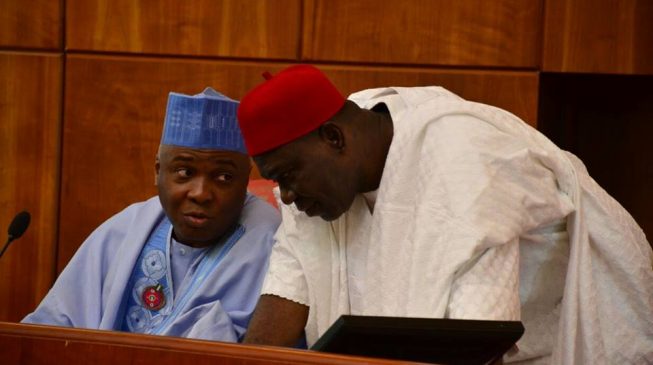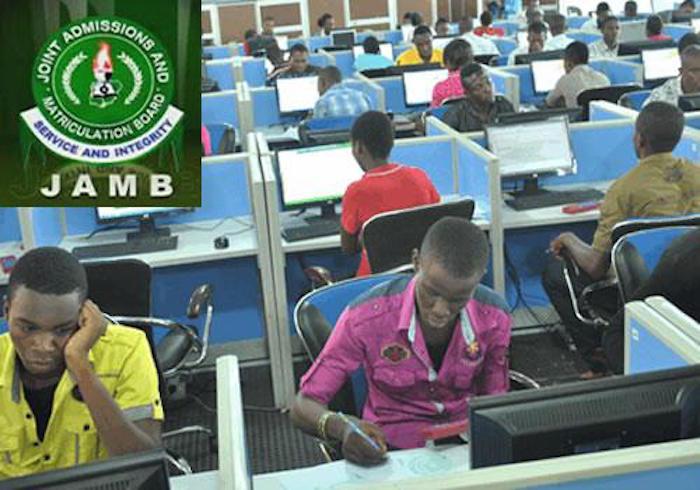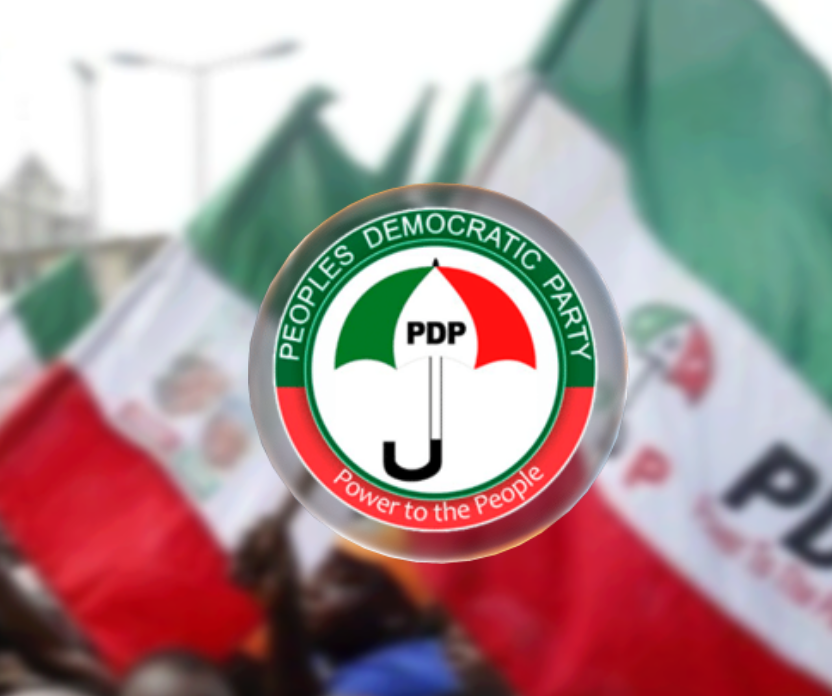In the history of legislative performances, especially in the last 19 years when the present democratic dispensation took off, no regime is known have performed creditably like the present eight senate under the leadership of Dr. Bukola Saraki.
In 38 months, 10 more months to the end of the regime, the administration has been able to pass more bills than many of their predecessors passed in their entire tenure.
Below is a description of the efforts the eight has made so far which stood them out among the rest:
BILLS PASSED
BILLS:
-8th Senate has Passed 238 Bills in 38 months
-7th Senate passed 128 in 4 years
-6th Senate passed 72 in 4 years
-5th Senate passed 129 in 4 years
2. PETITIONS:
-8th Senate has cleared 155 petitions in 33 months.
-7th Senate cleared 6 petitions in 4 years.
-6th Senate cleared 6 petitions in 4 years.
INTERVENTIONS // ACHIEVEMENTS
2015
-In 2015, the Senate President promised to pass comprehensive electoral reform laws before the election season starts. This promise was actualized in April 2017.
-In August, 2015, Senate mandated Nigerian Electricity Regulatory Commission, NERC to immediately abolish fixed charges on electricity consumption, and bulk marketing of villages and communities.
-In November, 2015, Senate detected the fraudulent activities involved in the implementation of TSA and resolutions to bring such act to a halt saving Nigeria N25billion from the implementation of the TSA policy.
2016.
-In March 2016, the Senate allocated N10bn to IDPs in the northeast in recognition of the dire situation.
-In May, 2016, the Senate investigation exposed abuse of import duty waivers on rice: the senate in a motion mandated its ad-hoc committee to investigate the removal of import waivers on rice.
-On the 4th of October, 2016, the Senate started investigation into the humanitarian crisis in the North East led to the dismissal of the Secretary to the Government of the Federation, Babachir Lawal, for misappropriating funds upwards of N200million.
-The Senate on the 30th of November, 2016 through a Motion, stopped the proposed hike in prices of data plan by the Nigerian Communications Commission.
-The Senate on the 30th of November, 2016 moved to investigate the Revenue Generating Agencies over alleged Leakages, Non Remittance and Misuse of Generated Revenue.
-On the 15th of December, 2016, the Senate set up a Senate Committee on Legislative Compliance to hold Senators and Senate Committees accountable to their deadlines, mandates, etc.
2017.
-In 2017, Senate intervention led to a review of the Central Bank of Nigeria, CBN policy to enable small business owner’s access to Forex.
-In 2017, to make the budget process more transparent, for the first time since 1999, the Senate laid the budget and its details on the floor of the plenary.
-In February, 2017, the Senate initiated the first-ever National Assembly Joint Public Hearing on the budget. 3-day Public Hearing was to give the public, CSOs and stakeholders like labour organizations an opportunity to weigh-in on the 2017 appropriations bill.
-On the 2nd of May, 2017, the Senate intervened in the issue of the death of 3 Queens College students. The Senate President promised that the Senate would set up a Stakeholder Summit to look into comprehensive education reform in the country; ensure that additional funds were included for Queens College’s infrastructural challenges in the 2017 Appropriation Bill. The second part of this promise has been kept.
-Senate promised to release the budget of the National Assembly as part of #OpenNASS. The institution fulfilled this promise on the 11th of May, 2017.
-In June 2017, the Senate intervened in the illegal migration across the Sahara and Mediterranean Sea to Europe.
-In June, 2017, the Senate condemned the Central Bank of Nigeria for spending a total of N1.223tn in 2016 on interventions without appropriation by the National Assembly.
-In July 2017, the Senate passed the #NotTooYoungToRunBill during its Constitution Review exercise.
-In July 2017, the Senate intervened in the closure of LAUTECH. The Senate’s intervention led to the re-opening of the school.
-In August, 2017, the Senate intervened in the illegal secret recruitment and accelerated the passage of a bill that will curb the rate of illegal recruitment in government agencies “Existing Vacancies in the Federal Civil Service (Prohibition) Bill”.
-In November 2017, the Senate intervened in the non-payment of Foreign Students scholarships by the Nigerian government.
-In December, 2017, the Senate held a Roundtable on Drug Abuse in Kano State. This intervention in the fight against drug abuse was accompanied by the initiation of two bills on drug abuse: the National Drug Control Bill and the National Mental Health Bill.
2018.
-In January, 2018, the Senate intervened in the conflicting, vague and unjust remedies which the Central Bank of Nigeria offers to victims of excess and arbitrary bank charges and illegal deductions by commercial banks.
-In January, 2018, the Senate visited Benue State and Zamfara State due to the killings (herdsmen attack) and urged NEMA to provide relief materials.
-In January, 2018, the Senate intervened on the modalities of establishing Federal Polytechnics, Federal Colleges of Education and Universities across Nigeria.
-In January, 2018, the Senate intervened in the fuel scarcity across the country through its Committee on Petroleum Downstream.
-In February, 2018, the Senate intervened in the security infrastructure of the country by holding a security summit on the 8th and 12th of February, 2018 to proper solutions.
-In February, 2018, the Senate held a round table on migration and human trafficking to curb the menace.
-In April, 2018, the Senate summoned four leading global system for mobile communications, GSM operators on the unsolicited adverts from them to their numerous customers.
-In May, 2018, the Senate intervened in Nigeria’s Healthcare sector by passing a clause in the 2018 budget that would mandate that 1 percent out of the Consolidated Revenue Fund (CRF) must be used for funding primary healthcare across the nation.
-In June, 2018, the Senate intervened in the Joint Health Sector Union (JOHESU) strike which affected the health sector across the country.
-On the 30th of May, 2018, the Nigerian Senate through a Motion intervened on the growing trend of sexual harassment in our higher institutions of learning — with a spotlight on the case of Miss Monica Osagie, an OAU student who named her lecturer in a ‘sex-for-grades’ scandal.
-In July, 2018, Senate also intervened in the security situation and resolved to completely review and amend the Nigeria Police Act (State and Community Policing).
-In July, 2018, the Senate took action through its Committee on Youth and Sports to investigate the death of the NYSC corper, Miss Linda Angela Igwetu.
-On the 4th of July, 2018, the Senate intervened in the unfortunate accident of a petrol tanker that led to an inferno on the Otedola bridge in Lagos State.
-The Senate has intervened in various issues as it affects individuals, organizations etc through its Committee on Ethics, Privileges and Public Petitions.
25 Major Bills Passed by the 8th Senate
ECONOMY
1. Petroleum Industry Governance Bill (PIGB) 2016
The Petroleum Industry (Governance & Institutional Reforms) Bill seeks to clean up the governance systems in the industry to improve regulatory cohesion and introduce international best prices that have helped other countries to be successful in the development of their oil and gas sectors.
This Bill will help to:
· Create efficient and effective governing institutions with clear and separate roles for the petroleum industry.
· Form a framework for the creation of commercially and profit-driven petroleum entities that ensure value addition and internalization of the petroleum industry.
· Promote transparency in the administration of petroleum resources of Nigeria and create a conducive business environment for petroleum industry operations.
2. Nigerian Ports and Harbours Authority Act (Amendment) Bill, 2016.
The Bill will provide for the efficient running of ports and harbours in Nigeria. It will establish a National Ports and Harbour Authority (to replace the Nigerian Ports Authority) and encourage private sector participation in the ports sector.
This Bill will:
· Transfer technical regulatory powers to the National Ports Authority.
· Provide the structure that is consistent with the current privatization exercise in the industry.
· Provide adequate structure for private sector and to promote efficiency based on principles of accountability, fairness, competition and transparency.
3. Commercial Agriculture Credit Scheme (Est, etc) Bill
The Commercial Agriculture Credit Scheme Bill provides the structure for the agricultural credit (loan) fund provided by government to encourage commercial agriculture in Nigeria.
This Bill will help to:
· Speed up development of the agricultural sector of the Nigerian economy by providing loans to commercial agricultural businesses at lower interest rates.
· Improve national food security by increasing food supply and effecting lower agricultural produce and product prices, thereby promoting lower food prices.
· Increase output, create jobs, expand the revenue base and increase foreign exchange earnings.
4. Federal Competition and Consumer Protection Bill, 2015.
This Bill promotes competition in Nigerian markets at all levels by removing monopolies, prohibiting abuse of a leading market position and punishing other restrictive trade and business practices.
This Bill will also:
· Encourage a balanced development of our economy as competition will enhance productivity in good and service delivery.
· Enlarge opportunities for our domestic businesses and our SME’s to compete and participate in the international market.
· Ensure that consumers are given the highest priority in the markets and that they are adequately protected from unfair market abuses.
5. Credit Bureau Reporting Bill, 2015
The Credit Reporting Bill provides a legal structure for Credit Bureau Services in Nigeria through the consumer measuring system. This system involves the establishment of a credible and credit database to determine the ability of every Nigerian to receive and repay a loan in Nigeria. This Bill will also:
· Increase the chances of access to loans for micro and small businesses and make more loans available to those who might not necessarily have collateral.
· Make it easier for loans to be given and recovered in the banking system. This is easier access to loans by the average Nigerian for personal or business-related reasons.
6. Secured Transactions in Movable Assets Act, 2017
The Secured Transactions in Movable Assets Act provides for the registration and supervision of security interest in movable properties and secured transactions. This Bill also:
• Creates a National Collateral Registry to receive, register and keep information about security interests in movable properties.
• Increases the availability of loans and reduce the interest rates for SMEs who will be able to use their movable property to obtain business capital for investment and growth.
• Provides the basis for a free-flowing credit market and also reduces the potential losses lenders face from non-payment.
7.Public Procurement Act (Amendment) Bill, 2016
The Public Procurement Act Amendment promotes local manufacturing in Nigeria. This Bill forms a part of the Senate’s ‘Made-In-Nigeria’ plan that encourages Nigerians to support locally made goods, thereby promoting the growth of the Nigerian economy. This Bill also:
· Ensures that there is timely completion of the procurement process in Nigeria by shortening the process of awarding contracts and in general, reducing the time spent on contract processing.
· Checks corruption in the procurement processes by making procurement processes more transparent while also increasing their efficiency and accountability.
· Allows local manufacturers the opportunity to sell the goods when the government is buying those types of goods. This will create job opportunities for citizens.
8.Bankruptcy and Insolvency Bill.
The Bankruptcy and Insolvency Bill repeals the Bankruptcy Act of 2004 and creates a business environment that guarantees smooth resolution bankruptcy issues. This Bill also:
· Seeks to ensure confidence between and/or among contractual parties.
· Facilitates the efficiency of business activities that support economic growth and development.
· Creates a legal framework that enumerates the guidelines for declaring bankruptcy of an individual or corporation and the various options for resolving any outstanding debts.
9. Companied and Allied Matters Act (CAMA)
The the repeal and re-enactment of the Companied and Allied Matters Act (CAMA) is aimed at making Nigeria’s business environment more effective and efficient for business owners and investors. This Bill will:
Ensure that prospective business owners can now register their businesses online, as well as ensure that individuals can now register sole proprietorships;
Removes all unnecessary regulatory provisions for small companies including the requirement for annual general meetings and company secretaries; and
Reduces the minimum share capital for all companies and start-ups in Nigeria – which will encourage more investments in our economy and create new jobs.
GOVERNANCE
1. Alteration of the Constitution to require the President and Governor to submit names of nominated ministers or commissioners within thirty days of taking the oath of office for confirmation.
This Constitutional Alteration to the Constitution of the Federal Republic of Nigeria, 1999 will require:
· The President to submit the names of nominated persons as Ministers within thirty days of taking the oath of office.
· The President to send the specific ministerial position along with the list of selected persons, for confirmation by the Senate.
· Governors to submit the names of nominated commissioners within thirty days of taking the of office and assign portfolios together with the nominations for confirmation by the State Houses of Assemblies.
2. Alteration of the Constitution to provide for independent candidature in elections
This Constitutional Alteration to the Constitution of the Federal Republic of Nigeria, 1999 will:
· Ensure that independent candidates are able to participate in country’s elections at the local, state and federal levels.
· Changes the procedures and guidelines for accessing the ballot by political parties and independent candidates.
· Ensure that the requirements and conditions for nominating an independent candidate are outlined by an act of the National Assembly for easy implementation.
3. Alteration of the Constitution to abrogate the State Joint Local Govt Accounts and empower each local govt council to maintain its own special account
This Constitutional Alteration to the Constitution of the Federal Republic of Nigeria, 1999 will:
· Empower each local government council to maintain its own special account.
· Ensure that all allocations for the local governments are paid directly from the federation’s account and from the government of the state.
· Cater for the salaries of primary school teachers to be taken from a proportion of the sum paid to local governments from the Federation Account.
4. National Assembly Budget and Research Office (Establishment, etc) Bill, 2016
The National Assembly Budget and Research Office (NABRO) establishment Bill aims to establish a legal entity that will be in charge of providing independent and unbiased analysis of the budget of the Federal Government and the National Assembly and assist all the committees of the National Assembly in developing their annual budgets. This Bill also:
· Mandates NABRO to assist the various Committees of the National Assembly with information about the impact of budgets and new Bills;
Ensures that the National Assembly receives the cost estimates and potential impact analysis of any proposed piece of legislation; and
Informs the Nation Assembly members with periodic forecasts of economic trends and fiscal policies.
5.North East Development Commission (NEDC) (Est,etc) Bill, 2015
The North East Development Commission Bill came about as a direct response to the large-scale devastation to the North East, which was caused by insurgents. The Bill aims to establish a commission that will be in charge of the recovery, restoration, reconstruction and rehabilitation of areas in the North East that were affected by the insurgency. The Bill also:
Addresses the issue of coordination amongst the humanitarian community operating in the North East, as it designates clearly defined roles to each actor operating in the region;
Ensures that the Commission will be responsible for liaising and consulting with international actors on the nature of humanitarian response that is needed in certain parts of the region; and
Ensures that the Commission receives and manages the funds allocated by the federal government, private citizens and international donors for the North East recovery efforts.
HEALTH, EDUCATION AND SOCIAL IMPACT
1. Compulsory Treatment and Care of Victims of Gunshots, Bill 2016
The Compulsory Treatment and Care of Victims of Gunshots Bill, which has now been signed into law makes it compulsory for hospitals to give immediate treatment and care to victims of gunshots and for closely related matters when brought for treatment. This Bill also:
· Ensures that any hospital that receives or accepts any person with a gunshot wound should report the fact to the nearest police station within two hours of commencement of treatment.
· Ensures that a quick response and treatment will be given to victims of gunshots without a police report.
· Mandates that hospitals can no longer demand for money before treatment is given to victims of gunshots – without monetary deposits.
2. Discrimination Against Persons with Disabilities (Prohibition) Bill, 2015
The Discrimination Against Persons with Disabilities (Prohibition) Bill ensures the integration of persons living with disabilities (PLWDs) into the society by encouraging their access to education and healthcare, while also protecting their social, economic and civil rights. This Bill will help to:
· Guarantee the right of PLWDs to access public premises, buildings, roads and sidewalks, through the mandatory provision of special facilities in these places;
· Ensure that right to education without discrimination or segregation, being entitled to free education to the secondary level with educational assistive services; and
· Provide protection from exploitation for PLWDs.
3. National Poverty Eradication Commission (Est., etc) Bill 2015
The National Poverty Eradication Commission Bill, aims to reduce the number of Nigerian citizens that are currently living below the poverty line. This Bill creates a statutory body that will be vested with the responsibility of coordinating the various poverty alleviation activities in Nigeria. This bill also:
· Ensures the effective coordination and implementation of the poverty alleviation and eradication policies, projects, programs, plans and international commitments;
· Sets up legislative frameworks for the coordination and delivery of social protection services and activities of the federal government; and
· Creates poverty alleviation schemes like the Youth Empowerment Scheme; the Farmers Empowerment Scheme; the Women Empowerment Scheme; the Rural Infrastructure Development Scheme; the Social Welfare Services Scheme; and Natural Resources Development and Conservation Scheme.
SECURITY
1. Senior Citizen Centre Bill, 2016
The Senior Citizens Centre Bill amongst other things creates Senior Citizens Centres around the country to provide for the needs of old and aged persons by identifying those needs, trainings and opportunities for them. This Bill also seeks to:
· Ensure the provision of and effective administration of centres that will provide basic welfare and recreational facilities for the senior citizens in Nigeria.
· Ensure that Nigeria’s Senior Citizen Centres keep proper records and statistics of senior citizens in the country.
· Ensure that the Senior Citizen Centres provide a wide variety of programs and services for seniors – including health, fitness, and wellness programs and recreational activities.
2. Abduction, Wrongful Restraints and Wrongful Confinement for Ransom Bill 2017
The Abduction, Wrongful Restraints and Wrongful Confinement for Ransom Bill is aimed at providing punitive measures against the kidnapping in Nigeria. This Bill also:
Prescribes punishments against individuals who willfully kidnap or wrongfully restrain or confine another person;
Specifies punishments for individuals who plan or willfully and intentionally provide information that leads to kidnapping of victims; and
Specifies punishments according to the Bill include life imprisonment and/or death, in the event that the abduction leads to the death of any victim.
3. Prohibition and Protection of Persons from Lynching, Mob Action and Extra Judicial Executions Bill, 2017 (Anti-Jungle Justice Bill)
The Prohibition and Protection of Persons from Lynching, Mob Action and Extra Judicial Executions Bill is aimed at protecting Nigerians from extra-judicial violence by prohibiting the dispensation of extra-judicial justice. The Bill also:
Specifies the punishments for primary agitators in lynchings and/or unlawful killings by mob action;
Criminalizes extra-judicial killings by security agencies; and
Specifies that states shall be held liable if the law enforcement agencies of the state that are charged with protecting lives are found to have been negligent — by failing to apprehend the perpetrators.
ANTI-CORRUPTION BILLS
1. Witness Protection Programme Bill, 2015
The Witness Protection Bill creates a programme in Nigeria that allows individuals — who provide important information, evidence or give assistance to law enforcement agencies during investigations, inquiries or prosecutions — to receive protection from the government, thereby encouraging the cooperation and support of witnesses (of crimes).
This Bill seeks to:
· Improve the delivery of justice in Nigeria using the testimonies and evidence that can lead to the proper prosecution of criminals.
· Provides confidentiality by fully restricting the release of information about the location or change of identity of “protectees” or “former protectees”
· Stipulate punitive measures for the breach of the law.
2. Mutual Assistance in Criminal Matters Bill 2016
The Mutual Assistance in Criminal Matters Bill, cancels the Money Laundering (Prohibition) Act of 2011 in order to create a wider legal framework that will help to restrict and prohibit the laundering of money both within and outside Nigeria, helping the Nigerian law enforcement agencies to receive better partnership and assistance from other government during the course money laundering investigations.
This Bill will:
· Empower law enforcement agencies to enable the identification, tracing, freezing, restraining, recovery, forfeiture and seizure of proceeds and benefits of crime wherever they are located.
· Expand the scope of supervisory bodies that deal with financial crimes.
· Provide protection for employees who may discover or suspect cases of ‘money laundering’ and report it to the appropriate authorities.
3. Nigeria Financial Intelligence Agency (Est, Etc.) Bill, 2017
The Nigerian Financial Intelligence Agency (NFIA) Bill will establish an agency whose sole duty will be to provide financial intelligence to all relevant ministries, departments and agencies, in line with international standards.
This bill will:
· Remove all the law enforcement powers of the NFIA by separating it from the EFCC (where it is currently located).
· Empower the agency to interact – receiving and sharing information at the international level with the Financial Action Task Force, the EGMONT Group of Financial Intelligence Units and FIUs across the world.
· strengthen the existing system for combating money
laundering and associated offences, financing of terrorism and proliferation of weapons of mass destruction.
4. Whistle Blowers Protection Bill 2015
The Whistle Blowers Protection Bill seeks to ensure that individuals who make disclosures that aid law enforcement agencies and prosecutors in criminal and/or corruption cases do not suffer reprisals.
This Bill will:
· Ensure that a whistle blower who makes a disclosure can take legal action if he/she is victimized, dismissed, suspended or harassed in any way as a result of their cooperation.
· Specify the proper procedures for making disclosures.
· Specify the kind of protection that will be made available to whistle blowers who may be at the risk of physical and/or violent attacks.
5.Federal Audit Services Commission Bill, 2018
The Federal Audit Service Commission Bill strengthens the use of public funds handling in Nigeria. The Bill seeks to empower the Office of the Auditor General of the Federation to bring about proper accountability in government spending. This Bill also:
· Establishes the Federal Audit Service Commission to cater for the staff of the Auditor-General of the Federation.
· Ensures that Nigeria has a modern Audit Act that deals with contemporary public accounts’ issues and ensures independence and impartiality in the management of public funds of the federation.
· Promotes transparency, accountability and integrity in the management of public funds of the federation

























 News6 years ago
News6 years ago
 Featured6 years ago
Featured6 years ago
 Boss Picks6 years ago
Boss Picks6 years ago
 Headline6 years ago
Headline6 years ago
 Headline6 years ago
Headline6 years ago
 Headline5 years ago
Headline5 years ago
 Headline6 years ago
Headline6 years ago
 Headline6 years ago
Headline6 years ago
